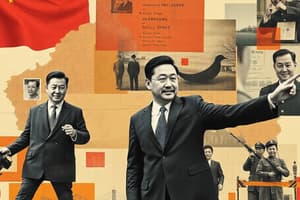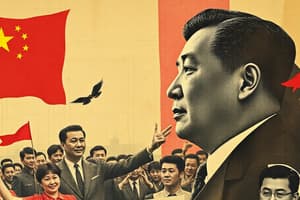Podcast
Questions and Answers
What is the highest authority in the Communist Party of China?
What is the highest authority in the Communist Party of China?
- Politburo Standing Committee
- National Congress (correct)
- Politburo
- Central Committee
Who is the current paramount leader of the Communist Party of China?
Who is the current paramount leader of the Communist Party of China?
- Mao Zedong
- Deng Xiaoping
- Jiang Zemin
- Xi Jinping (correct)
What is the basic unit of the Communist Party of China?
What is the basic unit of the Communist Party of China?
- Party committees
- Politburo
- Party cells (correct)
- Party branches
What is the official ideology of the Communist Party of China?
What is the official ideology of the Communist Party of China?
What is a major criticism of the Communist Party of China?
What is a major criticism of the Communist Party of China?
What role does the Communist Party of China play in the government?
What role does the Communist Party of China play in the government?
Flashcards are hidden until you start studying
Study Notes
Communist Party of China (CPC)
History
- Founded in 1921 by Chen Duxiu and Li Dazhao
- Initially based on Marxism-Leninism, later incorporated Mao Zedong Thought
- Played a key role in the Chinese Civil War (1927-1950) and the Chinese Revolution
Structure
- National Congress: highest authority, meets every 5 years to set policy and elect leaders
- Central Committee: implements decisions, has around 200 members
- Politburo: top leadership, around 25 members
- Politburo Standing Committee: most powerful body, around 7 members
Leadership
- Paramount leader: highest-ranking leader, typically the General Secretary of the CPC
- Current paramount leader: Xi Jinping
- Previous notable leaders: Mao Zedong, Deng Xiaoping, Jiang Zemin, Hu Jintao
Ideology
- Official ideology: Socialism with Chinese characteristics
- Emphasizes economic development, social stability, and national unity
- Incorporates elements of Marxism, Leninism, and Maoism
Organization
- Party cells: basic units of the CPC, found in workplaces, schools, and communities
- Party committees: oversee local and regional governance
- Party branches: operate in towns, cities, and provinces
Role in Government
- The CPC is the sole ruling party in China
- Party members hold key positions in government, military, and state-owned enterprises
- The CPC sets the policy direction and approves major decisions
Criticisms and Controversies
- Human rights concerns: censorship, suppression of dissent, and restrictions on individual freedoms
- Corruption: allegations of graft, nepotism, and abuse of power
- Lack of transparency: limited access to information and decision-making processes
History of the Communist Party of China (CPC)
- Founded in 1921 by Chen Duxiu and Li Dazhao
- Initially based on Marxism-Leninism, later incorporated Mao Zedong Thought
- Played a key role in the Chinese Civil War (1927-1950) and the Chinese Revolution
Structure of the CPC
- National Congress: highest authority, meets every 5 years to set policy and elect leaders
- Central Committee: implements decisions, has around 200 members
- Politburo: top leadership, around 25 members
- Politburo Standing Committee: most powerful body, around 7 members
Leadership of the CPC
- Paramount leader: highest-ranking leader, typically the General Secretary of the CPC
- Current paramount leader: Xi Jinping
- Previous notable leaders: Mao Zedong, Deng Xiaoping, Jiang Zemin, Hu Jintao
Ideology of the CPC
- Official ideology: Socialism with Chinese characteristics
- Emphasizes economic development, social stability, and national unity
- Incorporates elements of Marxism, Leninism, and Maoism
Organization of the CPC
- Party cells: basic units of the CPC, found in workplaces, schools, and communities
- Party committees: oversee local and regional governance
- Party branches: operate in towns, cities, and provinces
Role of the CPC in Government
- The CPC is the sole ruling party in China
- Party members hold key positions in government, military, and state-owned enterprises
- The CPC sets the policy direction and approves major decisions
Criticisms and Controversies of the CPC
- Human rights concerns: censorship, suppression of dissent, and restrictions on individual freedoms
- Corruption: allegations of graft, nepotism, and abuse of power
- Lack of transparency: limited access to information and decision-making processes
Studying That Suits You
Use AI to generate personalized quizzes and flashcards to suit your learning preferences.




